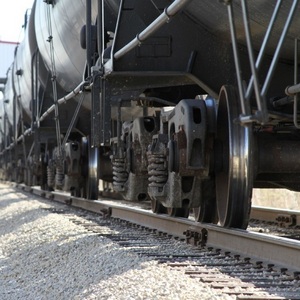Class I railroads file status reports for week ending Nov. 8

November 14, 2014
BY Erin Krueger
Class I railroads have filed their fourth weekly status reports with the Surface Transportation Board. The reports provide an overview of operational performance for the week ending Nov. 8.
BNSF Railway Co. reported system-average train speeds of 21.9 miles per hour (mph) for ethanol unit trains, and 19.7 mph for grain unit trains. The weekly average terminal dwell time, excluding cars on run through trains, was 29.1 hours. The BNSF reported 257,588 total cars on the line for the week, including 58,051 tank cars. The weekly average dwell time at origin for ethanol unit trains was 19.7 hours. For grain unit grains it was 10.1 hours. The weekly average dwell time at origin for oil and coal unit trains was 5.6 hours and 4.2 hours, respectively. The weekly total number of trains held short of destination or scheduled interchange for longer than six hours was eight for ethanol unit trains and 151 for grain unit trains. According to BNSF 100 loaded ethanol cars in revenue service that hadn’t moved in more than 120 hours, along with 128 empty ethanol cars in revenue service.. The weekly total number of loaded grain cars in revenue servicethat hadn’t moved more than 120 hours was 919, for empty grain cars it was 682. The weekly total number of loaded cars in revenue service that hadn’t moved in 48 to 120 hours was 915 for ethanol and 2,262 for grain. The weekly total number of empty cars in revenue service that hadn’t moved in 48 to 120 hours was 1,032 for ethanol and 2,313 for grain.
Advertisement
Canadian Pacific reported system average rail train speeds of 19.2 mph for ethanol unit trains, and 16 mph for grain unit trains. The weekly average terminal dwell time on run through trains was 19 hours. Canadian Pacific reported 31,693 rail cars on the line for the week, including 1,135 tank cars. The weekly average dwell time at origin for ethanol unit trains was 20.8 hours, for grain units it was 21.8 hours. The weekly total number of trains held short of destination or scheduled interchange for longer than six hours was eight for ethanol unit trains and 10 for grain unit trains. Canadian Pacific didn’t report any ethanol cars, loaded or empty, that hadn’t moved in more than 48 hours for the week. However, 55 loaded grain cars in revenue service and 68 empty grain cars in revenue service hadn’t moved in more than 120 hours. In addition, 260 loaded grain cars in revenue service and 96 empty grain cars in revenue service hadn’t moved in between 48 and 120 hours.
The Canadian National Railway Co., Chicago Transportation Coordination Office, CSX Transportation Inc., Kansas City Southern Railway Co., Norfolk Southern Corp., and Union Pacific Railway Co. also filed the weekly reports.
The STB took action to require these reports in in response to concerns raised at recent hearings, including one that featured testimony from two South Dakota-based ethanol producers. The concerns have primarily focused on the impact of poor and delayed service on the BNSF and CP railways. According to the STB, the reports will promote industry-wide transparency, accountability and improvements in rail service.
Advertisement
The STB has indicated it currently intends to collect this data on a temporary basis. However, a rulemaking will be initiated in the near future to determine whether to institute permanent data reporting requirements on service performance. Full copies of the weekly service reports can be downloaded from the STB website here.
Related Stories
Saipem has been awarded an EPC contract by Enilive for the expansion of the company’s biorefinery in Porto Marghera, near Venice. The project will boost total nameplate capacity and enable the production of SAF.
Global digital shipbuilder Incat Crowther announced on June 11 the company has been commissioned by Los Angeles operator Catalina Express to design a new low-emission, renewable diesel-powered passenger ferry.
International Air Transport Association has announced the release of the Sustainable Aviation Fuel (SAF) Matchmaker platform, to facilitate SAF procurement between airlines and SAF producers by matching requests for SAF supply with offers.
Alfanar on June 20 officially opened its new office in London, further reaffirming its continued investment in the U.K. The company is developing Lighthouse Green Fuels, a U.K.-based SAF project that is expected to be complete in 2029.
ATR and French SAF aggregator ATOBA Energy on June 19 signed a memorandum of understanding (MOU) to explore ways to facilitate and accelerate sustainable aviation fuel (SAF) adoption for ATR operators.
Upcoming Events










